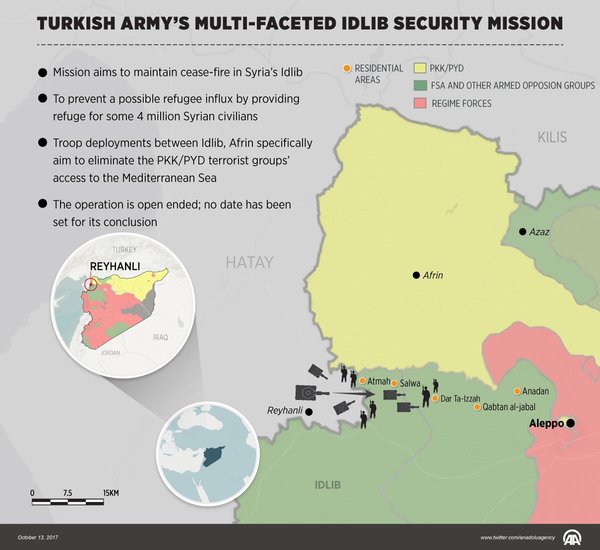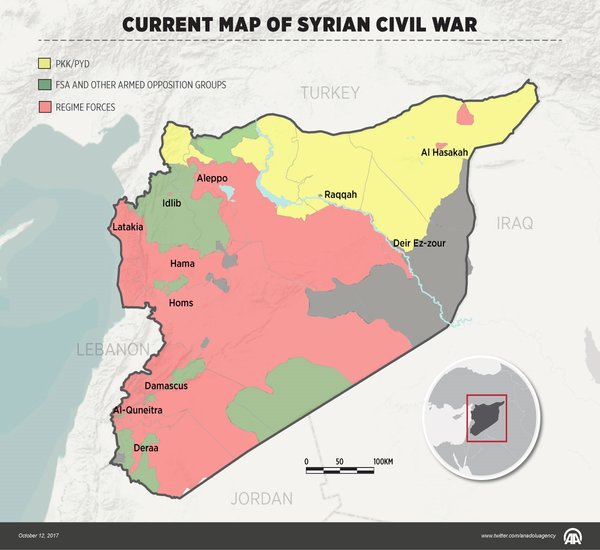Turkey has continued to deploy troops to Syria's Idlib province in order to set up observation posts to monitor the cease-fire, following up on an international agreement to establish de-escalation zones in the war-torn country.
Military convoys, which departed from the Reyhanli district in Turkey's southern Hatay province, arrived in northern Idlib late Thursday.

The troops have initially been deployed near Afrin, an Aleppo district near the Turkish border held by the PKK/PYD terrorist organization.
The deployment will continue along the border of Idlib and Afrin, under rules of engagement agreed to in May among guarantor countries Turkey, Iran and Russia. Ankara backs groups opposed to Syrian leader Bashar al-Assad, while Russia and Iran support Assad's regime.
Turkish armed forces will eventually set up observation posts in more than 10 areas, beginning in northern Idlib and gradually extending to the southern part of the province.
The mission, which is being carried out in cooperation with the Free Syrian Army, aims to monitor the cease-fire in Idlib, while Russia will set up observation posts outside the province for the same purpose.
Halting refugee influx
The Turkish troop deployment also aims to create the necessary conditions to maintain the cease-fire between the Syrian regime and opposition groups, end conflicts, allow humanitarian aid to reach those who need it, and ensure the return of displaced persons to their homes.
It also aims to prevent a fresh influx of Syrian refugees into Turkey.
There were concerns that the Assad regime, backed by Iran and Russia, would launch more attacks in Idlib if the cease-fire failed to hold. In such a case, it was feared that millions of people might flood across the border into Turkey.
More than 1 million people are already living in camps near the border between Turkey and Syria.
The Turkish deployment also aims to provide safe shelter for civilians.
By deploying forces, Turkey will also be establishing a security barrier to prevent the spread of the PKK/PYD, which is currently controlling Afrin.
The terrorist organization, which has occupied Afrin since 2011, needs to establish control over parts of Idlib in order to secure a corridor from the Iraqi border to the Mediterranean.
Idlib
Idlib, which is located in northwestern Syria on the Turkish border, faced intense attacks by the Assad regime after a vicious civil war broke out in 2011.
After March 2015, Idlib was no longer under the control of the Assad regime and was dominated by military opposition groups and anti-regime armed organizations.
With a previous population of around 2.5 million, the city is now crammed with about 4 million people, following the arrival of civilians who fled violence in central Syria.
The most effective military opposition groups in Idlib, Ahrar al-Sham and Tahrir al-Sham, both withdrew from the city nearly three months ago. Idlib is currently governed by a local council headed by civilians.

The Syrian Interim Government provides the services that the council offers the public.
There are no armed groups or organizations in the city; rather, these elements are currently based in rural areas and checkpoints set up around the city.
In recent months, the influence of Tahrir al-Sham has increased in the area. There are also many local groups in Idlib operating under the umbrella of the Free Syrian Army.
During recent peace talks in Kazakh capital Astana, the three guarantor countries agreed to establish de-escalation zones in Idlib and in parts of the Aleppo, Latakia and Hama provinces.